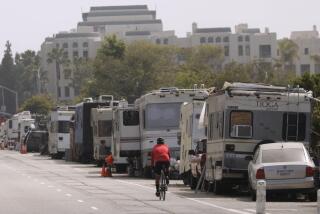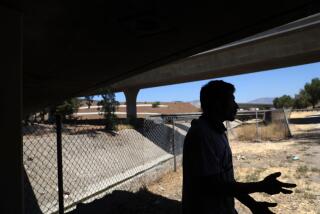San Francisco warns RV occupants: Accept help or be towed

- Share via
San Francisco plans to tow RVs and other oversized vehicles parked overnight on city streets if the people living inside them refuse offers of shelter, the city confirmed Friday.
Following complaints from businesses and residents about the occupied vehicles, Mayor London Breed said the city will make parking between midnight and 6 a.m. a towable offense for oversized vehicles whose occupants refuse offers of housing or other services.
“San Francisco is a compassionate City that will always lead with offers for housing and shelter, and other supportive services, but we must enforce our laws to ensure that our streets are safe, livable, and accessible to everyone,” Breed said in a statement. “Our message has been clear: accepting our help is not just an option, it is the option.”
While the overall number of unsheltered homeless individuals in San Francisco has declined since 2019, the percentage of unhoused people who live in vehicles instead of tents or other street shelter has grown.
The city counted 1,444 people living in vehicles in its most recent census of unhoused individuals, a 37% increase from 2022. Ninety percent of the 130 unsheltered families the city counted were living in a vehicle.
San Francisco Supervisor Joel Engardio told the San Francisco Chronicle that he receives frequent complaints from residents in his Sunset District about parking problems, litter and concerning behavior related to the inhabited vehicles.
“We need to support and create the construction of new housing and shelter for people, but we just can’t let people park on the street indefinitely and create problems for the residents,” he told the paper.
In 2019, the Los Angeles Homeless Services Authority found that more than 40% of the city’s unhoused population — a total of 14,000 people — were living in cars, vans, RVs or other vehicles in Los Angeles County.
In August, the Los Angeles City Council voted unanimously to order city agencies to come up with a program that would restrict oversized vehicle parking in residential areas while also increasing services for the people living in them.
“Our city is not an RV park, and we can’t and shouldn’t put up with the widespread impacts these RV encampments cause,” Councilmember Traci Park said at the time.
More to Read
Sign up for Essential California
The most important California stories and recommendations in your inbox every morning.
You may occasionally receive promotional content from the Los Angeles Times.










